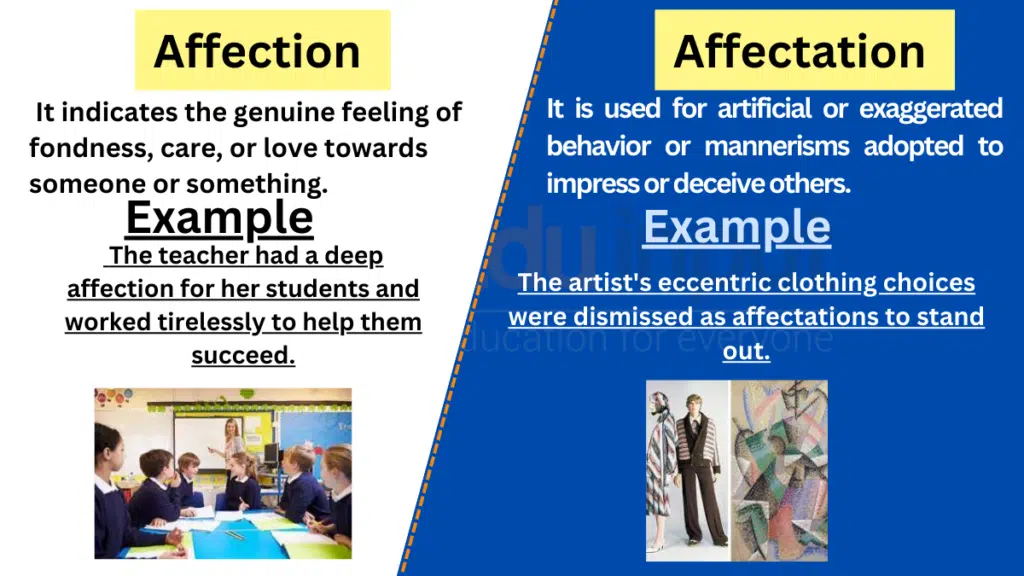Affection vs Affectation-Difference Between and Examples
Understanding the difference between “affection” and “affectation” is crucial for genuine communication and emotional expression. “Affection” refers to genuine feelings of love and fondness, while “affectation” signifies artificial or exaggerated behaviors aimed at impressing or deceiving others. By recognizing these distinctions, we can cultivate and express authentic emotions while avoiding superficial or insincere behaviors.

Meanings and Examples
Affection meaning
Affection is a noun. It indicates the genuine feeling of fondness, care, or love towards someone or something.
Examples
a) She showed affection towards her pet by cuddling and stroking it.
b) The couple expressed their affection for each other through loving gestures and kind words.
c) The teacher had a deep affection for her students and worked tirelessly to help them succeed.
d) He felt a strong affection for nature and often spent time exploring the outdoors.
e) The family’s affection for each other was evident in their close-knit relationships and constant support.
Affectation meaning
Affectation is a noun. It is used for artificial or exaggerated behavior or mannerisms adopted to impress or deceive others.
Examples
a) Her accent was an affectation she put on to appear more sophisticated.
b) His extravagant gestures were viewed as affectations rather than genuine expressions of emotion.
c) The politician’s humble persona was seen by many as an affectation to gain public favor.
d) The artist’s eccentric clothing choices were dismissed as affectations to stand out.
e) Her pretentious vocabulary and mannerisms were clearly affectations to fit into a particular social group.
Differences between Affection and Affectation
| Criteria | Affection | Affectation |
| Meaning | A genuine feeling of fondness, care, or love | Artificial or exaggerated behavior |
| Part of Speech | Noun | Noun |
| Pronunciation | əˈfɛkʃən | ˌæfɛkˈteɪʃən |
| Usage | Expressing genuine emotions | Displaying artificial behavior |
Grammatical Aspects:
Adjective:
Affection: “Affection” does not have an adjective form.
Affectation: “Affectation” does not have an adjective form.
Pronoun:
Affection: “Affection” is not used as a pronoun.
Affectation: “Affectation” is not used as a pronoun.
Verb:
Affection: “Affection” is not used as a verb.
Affectation: “Affectation” is not used as a verb.
Adverb:
Affection: “Affection” does not have an adverb form.
Affectation: “Affectation” does not have an adverb form.
Usage in a Paragraph:
She displayed genuine affection towards her friends and family, always offering a listening ear and warm hugs. Her caring nature and sincere actions reflected her deep emotional connection with others. In contrast, some individuals adopt affectation, pretending to be someone they are not, in order to gain attention or admiration. These affectations often come across as contrived and insincere, lacking the authenticity of genuine affection. True affection stems from the heart, while affectation masks one’s true self.



Leave a Reply